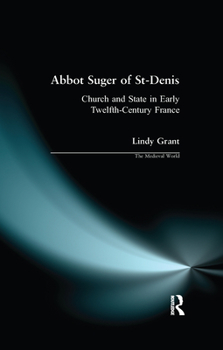Abbot Suger of St-Denis: Church and State in Early Twelfth-Century France
Select Format
Select Condition 
Book Overview
Based on a fresh reading of primary sources, Lindy Grant's comprehensive biography of Abbot Suger (1081-1151) provides a reassessment of a key figure of the twelfth century. Active in secular and religious affairs alike - Suger was Regent of France and also abbot of one of the most important abbeys in Europe during the time of the Gregorian reforms. But he is primarily remembered as a great artistic patron whose commissions included buildings in the...
Format:Paperback
Language:English
ISBN:0582051509
ISBN13:9780582051508
Release Date:May 1998
Publisher:Routledge
Length:358 Pages
Weight:1.00 lbs.
Dimensions:0.9" x 5.5" x 8.5"
Customer Reviews
3 ratings
Suger: bitter-sweet revelations
Published by Thriftbooks.com User , 17 years ago
Abbot Suger: what does this name mean to you? Counsellor and friend to French kings, who instilled order and a respect for hierarchical government in Capetian France? Indeed, the man who invented the idea of France? Or how about the original theologian who advocated Neo-Platonism and the anagogical method, who met and corresponded on equal terms with popes and saints? Or perhaps the radical and transforming architect who introduced the western world to the glories of Gothic through his grand works at St-Denis? Well, this book is for you, for you are right and you are wrong. And here's how! Suger is a seminal figure in both art history and the political history of early-medieval France. But first you need to know from where I am coming. As a history graduate (of other times and other realms), but as a non-academic with an interest in architecture and the medieval world, I found this volume a fascinating read. I have also visited the abbey, now lost in a suburb of greater Paris. So my review is from someone with a layman's keen interest, but one informed by wide reading, who remembers a little of his Panovsky and has savoured some of Suger's own writings. Dr Grant has split her work into four parts in which she respectively sets the scene; examines Suger's secular life; considers his ecclesiastical career; and finally assesses his influence. It is a revisionist text that seeks over its three-hundred pages to re-assess closely the traditional view of Suger as a reformer and innovator: "The Suger that emerges from a close inspection of his life is a very different figure from the genial, generous, warm-hearted enthusiast imagined by Panovsky." She argues that Suger was not an original political thinker or an original theologian, but "was a consummate politician, which is a very different thing. ... [and] his theological views were governed by a strong desire for orthodoxy." The originality of his artistic endeavours are also attacked. His primary motivation was not necessarily to promote the glory of France, the glory of Louis VI and VII, or to the reformist cause, but was rather to promote the Abbey of St-Denis: "We come back to the fact that it would be impossible to overstress the importance to Suger of his saint and his abbey." The author's arguments are cogent ones as she marshals the facts of authorship and chronology, and reviews the materials that have survived the depredations of time. Indeed, it is the very accident of survival that has skewed previous approaches to Suger, creating misleading impressions of his importance and character. This is not, though, a hatchet job worthy of a tabloid newspaper editor. She gives credit where credit is due, and one senses that her respect for her subject grows the more she cuts away the forest of misconceptions - some planted by later historians, some planted by contemporaries, and some planted by Suger himself - that surround his person and actions. For instance, she readily grants that Suger's i
Superb study of Suger's historical importance
Published by Thriftbooks.com User , 22 years ago
The book is well-written and well-documented; Grant has done some revisionary work which the reader might want to check against other historians before deciding whether to accept her comclusions -- I did accept them for the most part.
Abbe Suger the father of Gothic architecture? Grant says no.
Published by Thriftbooks.com User , 26 years ago
This is the most current book on the topic for anyone researching this fascinating subject. Lindy Grant's work dispells many of the Panofskian myths about Abbe Suger as the ideological facilitator of the birth of Gothic architecture at St-Denis with fascinating detail. It is quite readable, and generally entertaining and informative. This is a must-read for any student of Medieval Architecture or History. Despite the work's appeal, it is unpretentiously more of a historical perspective than an art historical one. Someone out there needs to publish one with a more art historical perspective.






